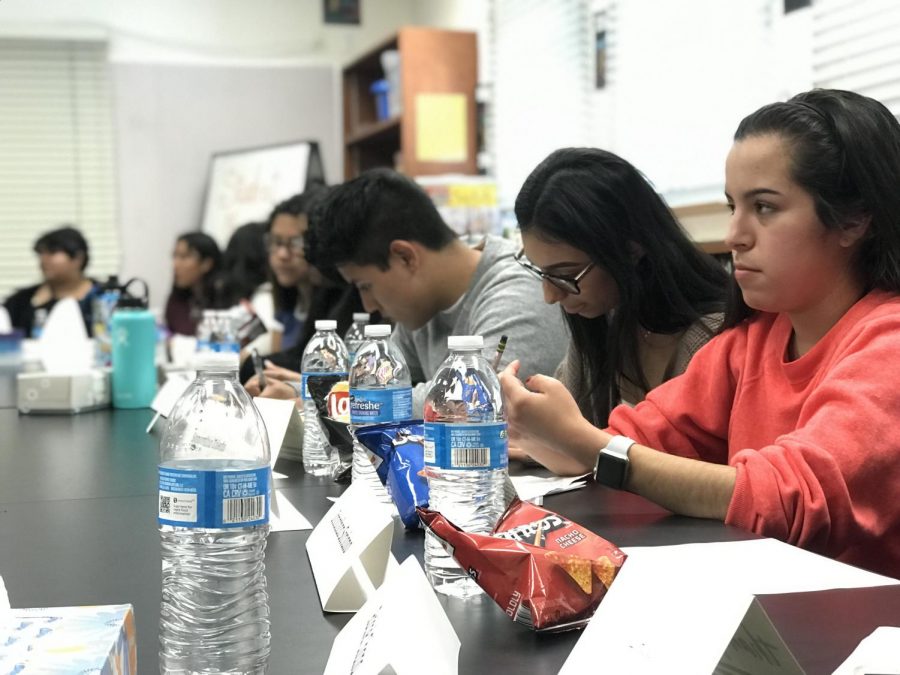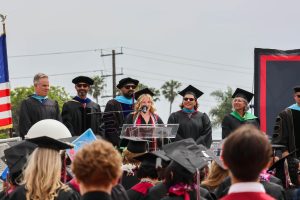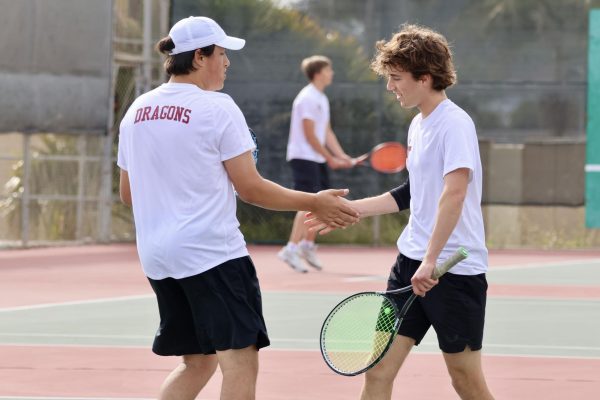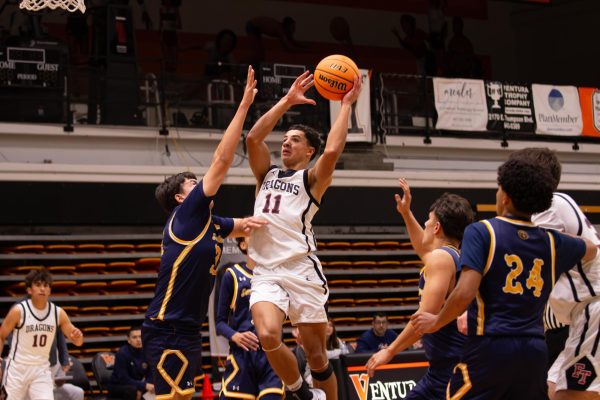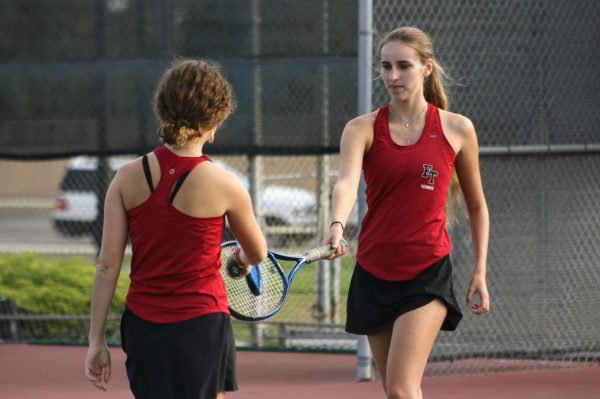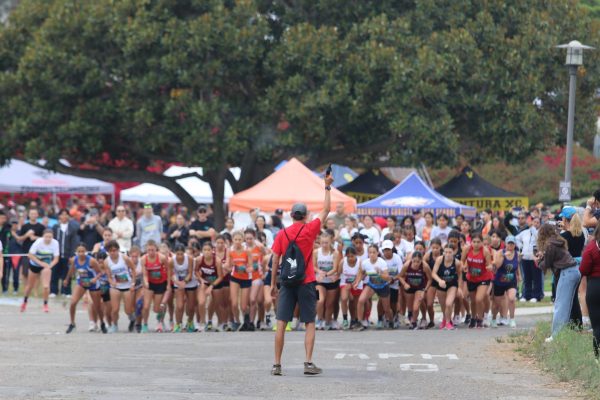“Stories of Minorities:” first-ever minority panel illustrates hardships faced by Foothill’s minority students
Students prepare for the first-ever minority panel on Mon., May 20.
Stefan Fahr
May 27, 2019
“Why aren’t you guys proud of us?” Jocelyn Soriano de Jesus ‘19 asked, the words tripping out of her mouth as the onset of tears made her voice quiver. “We work so hard.”
Soriano de Jesus was referencing the lack of attention towards the accomplishments of students in Foothill’s Advancement Via Individual Determination (AVID) program, towards which she and other AVID students on the minority panel made vocal their feelings of consistently being consigned to the margins.
On Mon. May 20, every open seat in the media center was occupied by those attending “Stories of Minorities,” the first-ever minority panel. A synthesis of the discussions held at a series of meetings in prior weeks, this panel intended to provide faculty, students and district officials with insight on the often unaddressed discriminatory behavior, invalidated feelings and hardships that minority students at Foothill face.
Josiah Beharry ‘19 spearheaded the three meetings and this panel with the objective of providing minority students with “a voice.”
According to Beharry, arranging a date for the panel was “quite difficult.”
“It was really difficult because the original date that we had it on was this Monday. Originally, what had happened was Bova and [Assistant Principal Lisa] Harvill went to [teacher Josiah] Guzik and told him that, ‘oh, we can’t have it on that day because we have meetings and stuff going on,’” Beharry explained. “The civil rights people were coming that day, so it kind of made it look like they didn’t want those people to hear the truth.”
Additionally, there were some complications with reserving a place for the meeting.
“I went in and I put in a request for Spirito Hall, originally, because as you can see, the media center was packed. It was really, really packed. We wanted to have Spirito Hall and I wanted to have a lot of space for the panel, because we were kind of squished in the media center, and when I turned in the request, they were like, ‘I don’t know if we can give you Monday,’ with no real reason.”
Ultimately the meeting was decided to be held in the media center after school on May 20.
Following a brief introduction by Principal Joe Bova, Beharry commenced the meeting by informing the attendees about the previous meetings that occurred, and also encouraged them to examine the pamphlets that were distributed before the meeting.
“There are 15 stories in [these pamphlets]. They’re all from alumni, sophomores, juniors, students who go here. They’re different backgrounds, all that sort of thing. They’re not people featured on this panel.”
The panel consisted of 15 students: Jacqueline Arroyo ‘19, Axel Baez ‘20, Denise Castro ‘19, Rachel Chang ‘19, Claudia Chavez-Solis ‘19, Yliana Claudio ‘19, Lesly Flores ‘20, Vanessa Luna ‘19, Olivia Martinez ‘19, Gianni Mendez ‘19, Xiomarra Salas ‘19, Jonathan Soriano ‘19, Soriano de Jesus, Samantha Toledo ‘20 and Hannah Yale ‘20.
The discourse was driven by Beharry asking a question and then identifying the students in the panel who were to answer it. The first question asked was whether students on the panel felt as though they belonged at Foothill; everyone answered this question.
Claudio kickstarted the discussion by describing how she found a sense of connectedness only during junior and senior year.
“I think from my freshman and sophomore year, I was very disconnected from the school. I partly do think that that was maybe just me growing up—it was definitely a growing process and I’m still growing to this day—but never really did I feel like I belong until my junior year,” Claudio said. “And still, now, I feel like I question a lot—whether being here is really where I belong.”
Salas followed, saying “I chose to be here—I applied and got in. I love the school, I love the people I’ve met as well. All these people [on the panel] I hold dear to my heart now. With these meetings from senior year, I’ve finally found those who will support me, but from freshman, sophomore and junior year, I didn’t feel like I belonged.”
The lack of a sense of belonging was echoed by most of the panel. Mendez related it back to her involvement in Honors and Advanced Placement (AP) classes, where she felt as if she was “invading [the] space” of non-minority students in her classes, and Castro seconded this, stating that she felt as if she had the “responsibility” to “prove” herself to her classmates.
“From my freshman year up to my senior year, I’ve experienced instances when I’ve felt isolated, especially in the higher classes, like AP courses,” she said.
Martinez said how she believed her “skin color” prevented her from admission to Bioscience and Journalism, and this sense of discrimination prevented her from applying to be Master of Ceremonies with Beharry at Air Guitar.
“I just felt like if I’m brown, they’re not going to choose me,” she said.
The panel agreed that the sense of aloneness was contributed to the fact that “walking into this school, […] you automatically see no one looks like you,” as Soriano de Jesus said.
Flores agreed with Soriano de Jesus because she feels like she has to change herself to “a certain level” so that she “can feel accepted.”
“I had to change who I am. I’m Mexican and I don’t speak Spanish in front of people because they just give me a weird stare, which makes me uncomfortable,” Flores said. “I feel like anybody should speak any language they want to, and I just think that this place can become better and be more diverse.”
“For me, it’s not that I don’t feel like I belong here, I just feel uncomfortable in certain classes,” Baez continued. “I have been in a situation where my teacher has in the past said the n-word in class just by context or for educational purposes. I just feel uncomfortable in that situation because I feel like the teacher shouldn’t be using that word at all.”
Toledo is disappointed by the fact that she wakes up every day and has to wonder about what new complaint from a minority student she will hear that day, as this has become something that occurs “almost every day.”
In acknowledging the feelings of isolation that other speakers in the panel elaborated upon, Luna said that she believes this common lack of support felt by minorities is a product of a lack of understanding and lack of representation on campus.
“I think that what a lot of us can agree on is that at Foothill, often times we feel ostracized because there are not enough people that look like us,” she said. “Like for me, I know in my Honors classes that I had never really found anybody that could relate to my background and understand personal family histories, but there are specific times at Foothill where there’s been situations where even if I’m not specifically involved—it’s not specifically directed to myself—I feel like this makes me feel uncomfortable; this should not be put on a school setting.”
Soriano, unlike the rest in the panel, spoke about how generally, his experience at Foothill has been positive, stating that he is “a very shy person, as most of [his] teachers would know,” but over his time at Foothill, he has “grown out of that shell.”
In her response, Chang spoke about the ramifications of a lack of understanding by others on minority experiences. She explained that when others who don’t tangibly have the ability to comprehend what minorities go through decide to attribute minorities’ frustration to being overly “angry” or “dramatic,” and this invalidation of experience becomes damaging.
“I think that a huge misconception is that when you’re a person of color, it’s not just a category. It’s not just the name, and it’s also not just a blood test,” Chang stated. “I think that all of us here, we’ve had certain experiences, either inside or outside of school—we look a certain way, get treated differently—and from all these different experiences, we have certain opinions and we have different reactions to certain events.”
Yale, who dubbed herself as the “token white person” of the panel, concluded the discussion of the first question with a perspective on the experiences of LGBTQ+ students on campus, citing the events of Pride Week as something that made many students “feel really unwelcomed here and unsupported here.”
“I think really the biggest instance that made a lot of us, including myself, feel really unwelcomed here and unsupported here was Pride Week and all of the issues surrounding that. I know the excuses that the problem was just miscommunications, which is true, but there was also a violation of the VUSD policy about equal access for student organizations, which was never addressed or talked about,” Yale elaborated.
Before the panel moved onto the second question, Claudio elaborated upon Yale’s concerns about Pride Week.
“I, and I know many people around me, heard a lot of promises, and we heard a lot of ‘this is going to happen, this is going to change, we’re going to hear you out.’ It’s quite discouraging as students when we hear those things when promises are made, and at the end, they fall through. Nothing gets accomplished. If there’s going to be a promise, at least I feel like there should be an effort to continue on that promise,” she said
Beharry then proceeded to ask the panel question two: do they think that Foothill recognizes their accomplishments? He selected Claudio, Chavez-Solis, Soriano de Jesus and Castro to address the question.
Claudio brought up an incident that occurred at the Senior Rally, in which she received magna cum laude, but “on the slide, it had the wrong last name.” It was demeaning to her that she has “worked very hard to make things happen for [herself], and even despite the situations that [she’s] gone through at home,” but her hard work was “invalidated” by a misspelling that made her question whether she had actually received the award or not.
“My name is Yliana Claudio,” she said. “Not Yliana Castro.”
Furthermore, she was frustrated that nothing happened about that incident besides a terse apology.
“Nothing really happened from it. […] ‘Sorry we put the wrong last name for you.’ That’s all that happened,” Claudio said.
Choking back tears, Chavez-Solis followed, articulating that “in the past, like freshman, sophomore and junior year, I don’t think that Foothill has really done anything regarding my culture. Like, I’ve worked hard, put in AP classes. It was only in senior year that I felt like teachers recognized all my hard work. I got, like, four awards, and I was so happy.”
Castro wanted to talk about her experience in Foothill’s AVID program, which she called “very influential and inspiring.” She believes that “staff and admin have been getting better in connecting with AVID,” but in previous years, “[staff and administration] just show up when [AVID] had food, like taco trucks.” As a result, she feels that there “could be more done.”
Soriano de Jesus continued the conversation about AVID, explaining that she is disappointed that “Foothill doesn’t recognize the AVID program.”
“As a freshman, you hear about D-Tech, Bioscience. Why aren’t you guys saying, ‘oh look, we have AVID! Join it!’,” she said. “Why can’t you show in the parent info night about AVID?”
Yale remembered for this year’s parent info night how tour guides had to talk about Bioscience, D-Tech and Journalism, but barely any attention was given to advertising for AVID.
“In reality, there are so many people at this school that are a part of AVID, and it changes so many lives,” Yale said. “People should be caring about it.”
The next question was about whether it is difficult for the parents of minority students to connect to the school. Arroyo said her “biggest problem” in terms of her parents being unable to connect to Foothill is “the language barrier in the office.”
“When my mom calls in to say that I’m sick or whatever, she can’t get through to whoever is in the office. It’s very frustrating for me and for her when they don’t understand her because she has very broken English, so it’s just sad to see my mom getting so upset about not being able to excuse my absence,” she said.
She finds it unfair that for those who don’t speak English, the process doesn’t take the two minutes that it should, but around 10 minutes while they wait for “someone else to come to the phone.”
Soriano de Jesus took this idea further, and even jokingly suggested that she herself record the messages in Spanish. Though she poked fun at the idea, she was serious about the need to have a Spanish speaker in the office that would improve communication for Spanish-speaking students and their parents.
“How hard is it to have, maybe, me record it, like ‘¡Hola!’,” she said, which was met with approving laughter from the audience. “Maybe have it in Spanish and in English. I think it would be just easier for us.”
Soriano mentioned how this lack of communication is also detrimental academically because she has so many absences which her mother hasn’t been able to effectively excuse.
The conversation then turned towards looking at larger-scale school events like academy presentations, informational nights and graduation. For many, their parents often don’t come to school because of the language barrier that even makes parents feel like they don’t belong.
Flores reflected Soriano de Jesus’ sadness regarding the lack of connection between her parents and her school.
“My parents don’t feel connected with Foothill at all. Just because they understand English, they talk English just a little, they’re not fluent. There might be five bilingual teachers, and it sucks because my parents, like Jocelyn said, they don’t attend any meetings which actually sucked, because I feel like they don’t have a connection with me or with the school,” Flores explained.
Soriano de Jesus continued, saying that of course, she wants her parents to see what is going on with her in an academic setting, but she can’t because “they won’t understand.”
Flores followed again, relating a personal experience about when she had to translate for her dad when they visited the college fair at Foothill.
“I’m bilingual but my Spanish isn’t too good, so it sucks because I can’t fully explain it to my dad or anything. I feel like if there was bilingual people here—there is, but more—I feel like [my parents] can get a connection with the school and I, and they feel more comfortable coming to this campus.”
Chavez-Solis wanted to add to the conversation, particularly about the fact that since her parents didn’t attend college, she had to navigate through the process largely herself.
“They don’t know what high school is like. So the first day, I had to know everything. For college, it’s the same thing,” Chavez-Solis struggled to say through tears. “I had to do everything on my own.”
Like Flores, she said that always translating for her parents is very tiring, and questioned, “why do I have to do that?”
She wishes that there would be “more help” for those who have parents that didn’t go to school here. She believes that once Foothill starts doing “small things like that,” parents of minority students “could connect with the school more.”
Claudio’s parents, like Chavez-Solis’, also did not go through the college process. She is the first in her family to have written college essays and supplements, which necessitated her reliance on the assistance of others. However, she had a very negative experience that prevented her from asking for more help.
“My goal in life is to go into the arts, and I had an experience with when I was getting college help, and it made me not want to go back and ask for help again. I was told in an indirect way, and maybe they were just trying to say what was best for me, but they told me that I should do business because art is not a safe or viable option as a profession,” Claudio described. “From that point on, I did not ask for help. I wrote all of my college essays on my own. […] It hurt extremely, to the point of where it made me question my passion, and I have gotten a lot of different reactions because of that.”
Before moving onto the third question, Chang elaborated more on the disconnect between minority students’ parents and the school in the context of major school events, particularly graduation. She states that because the entire presentation is in English, there is a significant lack of accessibility to parents who do not speak or understand English fluently, and as a result, they end up “just sitting there,” unable to “understand anything.”
“The most ideal situation would be for everything that’s happening at graduation, there would be a Spanish translation projected on the screen, or something like that so that all of it’s accessible. I know that’s a lot to ask for, especially since it’s such a big job to get graduation set up in the first place,” Chang said. “[Soriano] auditioned to give a speech in Spanish, a three-minute speech, just for three minutes, and he didn’t get selected. […] How long is the principal going to be speaking? How long is the ASB president going to be speaking? How long is everyone else going to be speaking? Can we not give three minutes, so that a family who can only speak Spanish has something in the ceremony?”
The next question Beharry asked was about whether students on the panel had ever asked administration with help regarding the situations they shared during the event. Arroyo spoke first, detailing an experience she had with a volleyball coach in which he appeared to practice around Halloween time and said, “‘look, Jacquie, I’m dressed as a Mexican!’” She was the only Mexican girl on the team, and to be “singled out like that,” she felt “so humiliated” that she quit. She didn’t ask for help because “after coming here for years,” she understood that “you go to admin for help, or you go to anybody for help, and you kind of expect nothing to be done about it.”
“There’s kind of like this culture, this environment, at Foothill where you kind of feel like nothing’s ever going to get done,” Arroyo stated.
Mendez talked after Arroyo, giving attendees of the meeting a backstory about a meeting she, Castro and Eulau had with an administrative official regarding the Ethnic Studies course.
“While talking to this principal, they said that there was going to be an Ethnic Studies class implemented into World History for sophomores, but a class like Ethnic Studies on its own would not interest anyone,” Mendez explained. “I didn’t think about this until I was done with the meeting—thinking about how many students could benefit from this type of class and learning about different cultures. The history that we do learn sophomore year is world history, but we focus on Europe, so what type of world history is that?”
Even though 40 people ended up registering for the course, she, Eulau and Castro were never issued an apology for the comments made by the administrator.
She questioned, “why would I want to go to a principal ever again and address my concerns when obviously I am being underestimated?”
Yale then spoke about her experiences with the administration in dealing with the damaging aftermath of Pride Week. She first talked about her disillusionment with a lack of execution of promises by a district representative that visited Foothill’s Queer-Straight Alliance (QSA) club to hear the concerns of the students.
“All of these promises were made about a diversity committee being made, and there’s been no follow-up, and a lot of queer students still have to have uncomfortable conversations with teachers and still get misgendered. There’s just no follow-up,” she said.
She then switched to illustrate an experience that she had when a friend of hers discovered anti-Semitic graffiti on campus.
“It was in the boys’ bathroom. I’ll admit, I snuck in there so I could see it. It was a common Nazi saying, written in German,” Yale described.
“I was like, ‘this is a hate crime.’ When my temple got graffitied a few months ago, it’s being investigated as a hate crime. So I thought, I should report this to the office and they’ll do something about it. They’ll want to address it in some way. The person that I spoke to in the office just said, ‘oh, that’s awful. We’ll close the bathroom and have someone clean it up.’ And that was it.”
According to Martinez, the same district representative that had visited QSA had also visited the Associated Student Body (ASB).
“We were talking to him about our concerns, and Josiah said something, and we brought up the fact about AVID, and how we don’t have any admin coming to AVID and recognizing us, and then he was telling us that we would get somebody in AVID to help us or talk to us about our concerns,” she said. “It happened earlier in the year, and it’s the end of the school year and we still haven’t had that conversation. It kind of sucks.”
In the penultimate question, students in the panel were asked how they felt in AP and Honors at Foothill.
Salas said, “I didn’t feel like I fit in, I didn’t feel like I was respected, and honestly, I was afraid to come to class and I had to drop it. It affected my grades, my transcript, all of that—it was a big old mess. I loved that class, but the social setting needs to change, I need to feel welcomed and accepted and I need to get the education that I signed up for.”
Claudio feels that an “unspoken hierarchy” is particularly “prevalent” in AP and Honors courses, which lends to the feeling that she has to prove herself worthy, which detracts from her education in that class.
“Maybe this is just partly me, but I feel like I’m being stared at because I have something to prove, or because the way I look or whatever it is. I do really like the Honors, the AP classes that I’ve taken, and I think they’re something that have been engaging for me, and I’ve enjoyed them, but when there is that elitism, […] it becomes very difficult to want to be in those classes.”
Toledo added on to what Claudio said, reminiscing upon her enjoyment of history and English classes that year. As a result, she was “strongly encouraged to take AP.” She expressed that discussions “targeted towards minorities,” the “environment” and the “stereotypes” contributed to a strong sense of loneliness she felt in those classes.
“You’re looked down upon. When you’re talking about subjects that include Mexico in the history, you get stared at, either with pity or disgust,” Toledo articulated, voice breaking from emotion. “You have to work so hard to prove yourself, and it’s like, I worked so hard in those classes, and […] just having to prove myself even more than the rest of the kids that are in that class […] sucks.” Especially “in a class full of white kids, it’s hard to talk about those feelings because you feel like no one really understands you,” Toledo said.
Chavez-Solis applied Toledo’s discussion about feeling alone to her experiences in moving from Honors last year to AP this year. She said, “the one thing that hasn’t changed how I feel in the class is I look around, and there’s like not that many people who look like me. And it’s not because other brown people are dumb. It’s not that. We’re discouraged.”
She described an experience she had with Castro during sophomore year, in which they were discussing participating in AP U.S. History and AP English the following year. Chavez-Solis was encouraging Castro to partake in the classes, but Castro refused, saying that she didn’t “‘want to feel the same way that [Castro has] been feeling.’ What really struck me is that her feeling is the same way that I’ve felt these four years.”
Furthermore, she discussed her own opinion of herself and her family has been “ignored or stereotyped,” and she feels like she can’t say anything because she is “shy.”
“There was an incident last year, where someone said something that really hurt me a lot. Like I still think about it, and I will never, ever forget that. […] We were talking about it with Eulau and Adams the other day, and I couldn’t get a word out. I started crying, and I felt like I couldn’t breathe. It was like that moment all over again. Why do I have to explain who I am? Why do you have to make assumptions about my culture? It shouldn’t be like that.”
She requests for teachers to be “more supportive” so that students who have experienced such incidents can comfortably consult them for advice.
Flores personally knows many students “who are so smart” that want to be enrolled in academy classes like those in Bioscience or D-Tech, but “they’re too scared” to enroll because “they don’t want to be the only colored students in those classes.” She says it’s “unfair how they feel like they have to be someone else that they’re not” just to fit in with a certain class.
Toledo added on to this idea by explaining the irony in how staff complains that there isn’t enough diversity in classes, yet they do nothing to encourage more diverse students to partake in certain courses; they end up providing this encouragement “when it’s too late.”
As a result of this lack of diversity, people like those in the panel feel “singled out,” as Castro phrased it. Being so isolated in these classes, Castro’s “mental health was taking a toll” sophomore year. Through tears, she explained how she decided not to take “challenging classes junior year” because of this, despite knowing that she is “very, very capable.”
On the first day of AP Literature, someone sat next to her, and then moved away; this happened two more times. She asked herself, “what’s wrong with me?” She decided not to put herself through that again, because the environment is too “unwelcoming,” as she expressed.
Claudio described a moment in which she shared a very personal story about her home life, but “other people in the class […] continued on to speak about things in certain ways that made it feel like [her] personal life was a joke.”
“The way that I live is just brushed over, because of the struggles that I’ve gone through, because of the struggles my mother has gone through, my siblings. In that instance, I really felt like my entire life was invalidated,” she explained. “That was the one moment where I really felt like this is not where I belong.”
Soriano de Jesus proceeded to describe her plight as a member of ASB: “how am I supposed to make everyone feel welcome when in the class I don’t feel welcome?”
She explained how she put in much effort to make a difference by appointing translators for parents and generally making minorities feel more welcome at school in accordance with the mission statement, but her passion is dampened by moments such as when she was mixed up with another Latina even though they looked nothing alike.
“How am I supposed to make a difference where I’m pushed aside in the class?” Soriano de Jesus asked. “Why do you want us there if you’re just going to push us aside?”
The last question asked students on the panel about positive experiences they have had with the staff at Foothill.
Martinez thanked teachers Cherie Eulau and Claire Adams, as well as Student Store Bookkeeper Othelia Blackler for their willingness to listen and their openness to discussion. She also mentioned her sadness at the fact that students were told that they’re “not allowed to talk to [Blackler] anymore,” because “she loves students, she loves everybody, like every student on campus.”
“I know that it hurts her because that’s who she’s here for,” Martinez said.
Soriano de Jesus thanked Counselor Juana Vega and Media Center Specialist Mayra Alejandra for their support, and she expressed her happiness at being able to bond with them over their similarities. She feels “so lucky to have these few teachers that [she] can talk to,” but she is disappointed at the fact that there are so few staff members who “kind of look like [her] and have the same background.”
Baez said that he has had “a lot of positive experiences at Foothill.”
“I want to thank Guzik first, because my freshman year of high school, the first day of high school, first period I had Guzik, but a bunch of other juniors took Spanish 3. Right off the bat, he just made me feel comfortable and […] he made me get out of my comfort zone. […] To this day, I see him around the hallways and he says hi, so he’s keeping in touch with me,” Baez said.
He also thanked Adams for being understanding, encouraging and making him feel comfortable; Eulau for making him feel comfortable and confident in an Honors class; Ferris for acting as a “second mom”; and Frazier for making him feel “safe.”
Salas thanked the audience for coming and actually listening to the stories that the minority panel had to present.
“I don’t know if you noticed, but we’re not fully adults yet,” Salas said, which was met with laughter from the crowd. “For us to be able to put this together and for you to listen, it just means a lot.”
Claudio also expressed her gratefulness that the audience came to listen, and mentioned that although most of the panel was composed of seniors, that did not mean “that [they] want this to be swept under the rug when [they] leave.”
“I would love to come back to this school and see the improvements because this is my high school. […] I want to be proud of Foothill,” she said.
Flores talked about her positive experiences with Frazier, Vega and Alejandra. She appreciates how Frazier is “funny” and “finds a way to brighten up your day,” and she thanks Vega for always encouraging a “positive mindset.” With Alejandra, Flores believes that she can “count on her” to help her with “personal issues” going on with her life because of their similar backgrounds.
Martinez also thanked the AVID teachers for their support and their desire to make students in the program feel comfortable.
Before Beharry closed the meeting with an uproar of applause, Castro commented one last thing about the power that teachers wield.
“Every teacher is good, but every teacher is great as long as they see you, and they notice you, and that they believe in you. The teachers who have believed that I could do something have been the most impactful,” Castro articulated. “I just want you guys to believe in your students and push them out of their comfort zone. They know that they can do so much more, but they don’t realize it. […] Just make them believe in themselves.”
Editor’s Note: Rachel Chang and Jonathan Soriano were not involved with the reporting for or production of this article.

